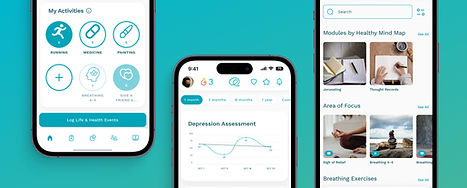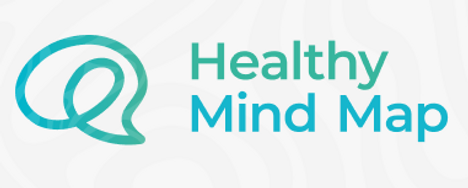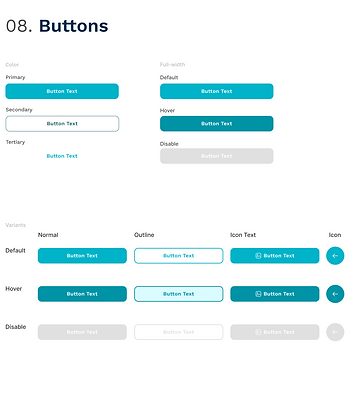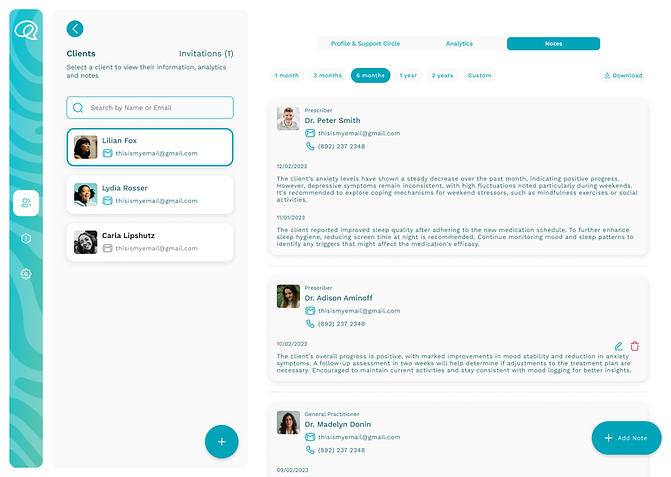
Healthy Mind Map
Overview
Healthy Mind Map is a mental health and wellness platform designed to support individuals facing depression, anxiety, and related conditions by helping them develop healthy habits, track emotional progress, and stay connected to a meaningful support system.
As the sole UX designer, I led the end-to-end design of the mobile app for patients, a web platform for healthcare providers, and an admin dashboard for internal management. The mobile app allows users to create personalized routines, log moods, complete self-assessments, and share progress with trusted contacts or professionals.
On the provider side, the HCP web app enables mental health professionals to view patient insights, send assessments, monitor activity, and offer timely guidance. Meanwhile, the admin platform gives internal teams full visibility into system activity, content management, and provider-patient coordination.
The goal was to create a connected, compassionate ecosystem that promotes accountability, clarity, and collaboration—making mental health care more personalized, proactive, and accessible.
Role
Product Designer
Timeline
8 months
Tools
Figma
Illustrator

Challenges
1 / Designing for Vulnerable User States
Creating an interface for users experiencing depression and anxiety required a delicate balance between simplicity, emotional safety, and motivation. The challenge was to avoid overwhelming users while still encouraging action and consistency.
2 / Supporting Multiple User Types Across Platforms
The product needed to serve patients, healthcare providers, and internal admins—each with different needs and goals. Ensuring a consistent yet role-specific experience across mobile and web platforms added complexity to the UX strategy.
3 / Maintaining Privacy While Fostering Connection
Allowing users to share their progress with trusted supporters or providers introduced challenges around data visibility, consent, and user control. It was crucial to design clear permission settings that respected user boundaries.
4 / Turning Abstract Mental Health Concepts into Actionable Features
Translating concepts like emotional wellness, routine building, and behavioral progress into concrete, measurable, and intuitive features (e.g., mood tracking, check-ins, assessments) required thoughtful UX framing and design clarity.
5 / Ensuring Engagement Without Pressure
Many users may struggle with consistency or feel guilt when they fall behind. The challenge was to create an experience that promotes gentle encouragement over pressure, using non-judgmental language, adaptive flows, and affirming feedback.
Branding & Visual Identity
The branding for Healthy Mind Map was designed to evoke a sense of calm, clarity, and emotional safety. Using soft gradients and organic wave patterns, the visual identity reflects the fluid, non-linear nature of mental health journeys. A soothing color palette combined with friendly, minimal iconography reinforces the app’s mission to feel supportive, approachable, and grounded, while still being modern and professional.








Mobile App & Core Features (Primary User)
1 / Activity & Habit Tracking
Users can build daily routines by selecting from a list of activities or creating their activities (e.g., journaling, mindfulness, hydration, movement).
The system gently encourages consistency while allowing flexibility, helping users build habits without feeling overwhelmed or judged.
2 / Support Circle
Users can invite trusted friends, family, or healthcare providers to join their support circle.
This fosters a sense of community and emotional accountability, giving users the confidence to stay on track while knowing they're not alone.
Shared progress is intentionally limited to key milestones or check-ins, ensuring privacy is protected while still encouraging support.
3 / Analytics
The app visualizes the user’s emotional and activity trends through a real-time analytics dashboard.
With clear, easy-to-read graphs and summaries, users gain valuable insight into how their habits and mood are connected over time.
This feature helps users identify patterns that might not be obvious day-to-day, making reflection and course-correction feel more natural and informed. They can also compare two data graphs to gain deeper inside (e.g. running activity vs Depression Assessment)
Users can also add Life Events they may think it affect their assessments and mood overtime.
3 / Assessments & Check-Ins
Built-in mood and behavior assessments help users reflect regularly and provide optional data-sharing with their healthcare provider.
These tools are designed to be short, stigma-free, and clinically grounded, offering insight without adding emotional burden.
The check-in experience adapts over time, becoming smarter and more personalized the more users engage with it.
3 / Resource Library
Users have access to a curated library of educational content, including articles, videos, and guided exercises tailored to their needs.
Resources are contextually recommended based on user activity and mood trends, making support feel timely and relevant.
The goal is to empower users with actionable tools and knowledge that complement their therapy or self-care practices.
Healthcare Professional Web App & Core Features
The Healthy Mind Map Provider Portal was designed to give mental health professionals a structured yet flexible way to monitor client progress, assign assessments, and support behavioral change between sessions. The platform prioritizes clarity, security, and responsiveness, enabling providers to deliver personalized care at scale.
1 / Client Management Dashboard
Providers can view a comprehensive list of their connected clients, complete with real-time insights on recent activity, assessment history, and mood trends.
This dashboard acts as a centralized hub, giving clinicians quick access to the most relevant data to guide upcoming sessions and interventions.
The interface is streamlined for focus, with filter and search tools to easily navigate growing caseloads.
2 / Assessment Assignment & Tracking
Providers can assign clinically informed assessments—including those marked as provider-only—from a preloaded library managed through the admin portal.
Each assessment can be customized with retake frequencies (e.g., weekly, monthly, quarterly), and completion is automatically tracked within the provider view.
Both patients and providers see the results, and assessments are stored long-term, ensuring continuity even if provider relationships change.
3 / Notes
The Notes feature allows providers to document important observations, session takeaways, and follow-up plans directly within a client's profile. Each note is time-stamped and saved privately, ensuring that only the provider (or authorized team members) can view and edit it.
Whether preparing for an upcoming session or reviewing historical data, the Notes tool gives mental health professionals a streamlined way to track progress, reference past discussions, and ensure no detail is lost between sessions.

Admin Web App & Core Features
1 / User Management
Admins can view, search, and manage all user accounts, including both patients and healthcare providers. In addition to that, they can verify Health Care Providers' credentials manually.
They can deactivate accounts, reset passwords, assign roles, and monitor platform activity. This feature ensures the platform remains secure and well-organized, especially as the user base scales.
2 / Assessment Library Control
Admins have full control over the platform’s assessment creation and management through a structured, user-friendly interface. They can define the title, focus area, delivery frequency, and assign custom scoring parameters to interpret results (for example, “Severe” or “Moderate”).
Questions can be added in various formats such as True/False, Multiple Choice, Likert Scale, and Open-ended, with options to assign weighted scores, set conditional logic, and flag sensitive content like self-harm indicators. This flexible system ensures all assessments are clinically appropriate, customizable, and aligned with the platform’s evolving mental health needs.
3 / Educational Resources & Guided Modules
The platform includes two key content types to support users beyond day-to-day habit tracking.
Educational Resources offer on-demand articles, videos, and tools covering topics like anxiety, depression, and emotional wellness. Admins can upload, tag, and manage resources for easy discovery.
Guided Modules, created by Healthy Mind Map, provide structured learning experiences made up of small reflective prompts and exercises. These modules are designed to reinforce therapy themes and promote self-guided growth.
Together, they give users practical, accessible support between sessions.
Outcome & Reflections
1 / A Connected Ecosystem for Mental Wellness
The Healthy Mind Map project delivered a fully integrated platform spanning the mobile app, healthcare provider portal, and admin dashboard. Together, these tools form a connected support system that empowers users to manage their mental health while enabling providers and admins to offer timely, personalized care.
2 / Designing with Empathy and Structure
A key challenge and achievement was balancing clinical integrity with emotional sensitivity. Every feature, from mood tracking to provider dashboards, was shaped to feel non-intrusive, supportive, and intuitive, especially for users navigating vulnerable mental states.
3 / System Thinking, Human Focus
This project pushed me to design across multiple user types and interfaces, while maintaining a consistent brand and UX foundation. It reinforced the importance of modular systems, role-specific functionality, and user-controlled privacy in digital health design.
4 / Built for Scale, Rooted in Care
Healthy Mind Map is now positioned as a scalable, clinically informed platform ready to evolve with its users. From habit-building to self-assessments and shared care, it offers the tools people need to feel seen, supported, and in control of their mental wellness journey.











